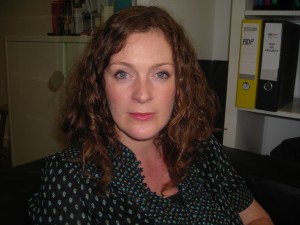
Lucy V Hay (left), Amy Walker, Marc Pye and Rebecca Gatward at the London Screenwriters' Festival 2010.
WRITING & KIDS, PT 2: Working from Home
The title of this post is a little misleading, as I feel it can be applied to anyone who works from home whilst looking after children – not just writers. And there are a lot of us: I am of course not just a writer, but a script reader and self employed teacher (ie. “outside” the state school system) as well. I know parents who make jewellery and other crafts whilst looking after children (my own parents did this for a time as I was growing up, in fact); accountants; copy editors; web designers – the list of jobs you can do in this way is endless.
The internet has called us Mumpreneurs, though of course it’s not just women working in this way, but men too. Creating your own work and becoming a sole trader, starting up your own limited company is hard work and sometimes means unsocial hours, but it also has many benefits. For me, my working hours mean I am nearly always available to pick up my daughter from school or have the kids at home with me if they’re (really) ill; in addition, I’ve never missed a nativity, school play or sports day.
Self employment is not the easy option by a long shot; for one thing, you’re never going to get rich, especially when work often comes in a “famine or feast” kind of way as it does with Bang2write. As a sole trader like me, you’re often working alone and this can be very isolating, especially from other parents at school. It’s hard to know how to answer that inevitable question at the school gates, “Do you work?” Say “yes” and some stay-at-home Mums think you’re trying to lord it over them in a “aha, I have the best of BOTH worlds” kind of way; say “no” and some think you could be lazy and/or have nothing to talk about, isolating you even further.
Though the above is hardly the end of the world, this is not something other working parents have to go through, as their children inevitably end up going to after school clubs and childminders. The worse things, then: job security – where is the next bit of work coming from? No sick pay, or poor information from people should know better – when I was pregnant with my daughter, I was advised by TWO places – my midwife and the local job centre – there was no such thing as Maternity Allowance for self employed women (but there was). This meant I was reading scripts again within two weeks of giving birth! Better still, the first script I read dealt with the rape and murder of a child. I was absolutely inconsolable.
Whilst I have friends working in offices etc who confess feeling guilty or gutted about missing the like of their baby’s first words or their childminder ended up taking the child on their first day of school, that need never happen to those parents working from home. But guilt is still very much part of your working life, too – only in a different way to other working parents. Take your pick: you don’t earn enough money to take the kids on a foreign holiday like their mates, you end up camping in the rain in Devon, instead. You can’t afford a swanky private school like the Smythes down the road and the local comprehensive is shit, but you can’t home school your kids either ‘cos you need to earn money whilst working from home. There are times the proverbial hits the fan on a project and you’re working quite literally day and night, including weekends, not seeing your kids, sometimes for little or even NO money (particularly on collaborations or if there has been a mistake). You see your colleagues and siblings train for their jobs and start on the career ladder and get higher and higher, whilst you stay more or less the same in your own working world – and then you worry you’re setting a poor example, especially if your kids **think** all you do is spend all day on Facebook.
All those horror stories and bad points aside however, working from home will always be my choice of employment. I’ve worked *for* others – “in the system” as it were – and believe the benefits of self employment outweigh the bad ones in the long term. If you’re thinking of taking the plunge as a “Mum/Dadpreneur” or as a professional writer then, here are my thoughts on combining working from home with looking after kids:
It’s all about routine again. There will be many times you’re fielding calls and emails or doing something work-related, whilst trying to keep a small child amused or seeing to an older kid’s needs. If you try and do all at once, not only will your brain explode, your kid will lose out. Routine here is key, just as outlined in the previous post about writing specs while looking after kids. You and your kids need to negotiate a deal that works for all of you. In my house now, I start on the admin of the day at about 8am usually, while the kids watch their morning cartoons, so most of my emails and urgent calls etc is done by approximately 10am (which also takes in the school run). When my daughter was not at school and my lad was still at primary, I had a different routine because my daughter liked to jump off sofas etc and start fights with her brother. Work out what needs to be done FIRST, via what your kids need and you can’t go far wrong. Then factor in the other stuff – a diary is essential if you don’t have a good memory or have many varied tasks that need doing – and structure your day and week accordingly. Breaking up your To Do list into small chunks seems a good strategy, especially when a small child is in the house, “little and often”, it all adds up.
Don’t Beat Yourself Up. There will be unsocial hours and there will be evenings and weekends taken up by work from time to time; it’s just the way of it. When my daughter was first born, I was doing my script reports every night from about 7pm for nearly a year, as I had zero childcare. But though you might miss bathtime or bedtime from time to time, this doesn’t make you a bad parent – and kids are very adaptable. Just recently I had to bow out of a family trip to the cinema because a ton of scripts fell on me from a great height from a prodco and I had to get started right away or drown. Both kids barely noticed my absence, especially when my husband bought them popcorn too. It’s a shame but a fact of life – and kids do understand.
It’s All About Agreements # 1: Timing. I have one long term Bang2writer who is nocturnal and used to call me past 10pm to discuss projects and script edits. At first I put up with this, thinking I *had* to, to keep his business. This changed when I was approximately 36 weeks pregnant and at the end of my tether for other reasons; I simply told him he had to either email me from now on or call me before 8pm because I actually go to bed at 10pm, as I have to be up at 6am for the kids. Not only did he apologise profusely, he then chastised me for not saying so earlier! My current rule is thus, then: the computer generally goes off about 7pm and it stays off; I don’t talk to Bang2writers after that time, either – tweets, FB msgs and emails are always welcome, but will be responded to in the morning. HOWEVER, if I am signed into Twitter or Facebook after those times (for instance, during #scriptchat at 8pm on a Sunday), I am fair game… but PLEASE still don’t call me on my mobile.
It’s All About Agreements # 2: Housework. My husband and I have an agreement regarding the housework; if I am working, I have no obligation to clean the house or do the chores, as I am already stretched two ways looking after a child and working at the same time. We can do the housework together in the evening. If I am NOT working however – and there are always “dry” periods to self employment, March always is for script reading I find, perhaps because of the end of the financial year? – then I will do it. Agreements like this are always worth re-negotiating as your needs change, too. For example, I am writing a novel at the moment on spec, which obviously requires a lot of time; I’m making no money from it at this specific time, but it needs doing as it is a specific opportunity that has come through my agent. In the past, I’ve done the same regarding trial scripts for TV shows, though I did not get those gigs, unfortunately. (I’m happy to say my husband understands and supports the nature of spec work and applies the same rule of thumb to the housework then as paid-for work like script reading or corporate or other paid-for writing work, though I’m aware some partners are not always as giving when money is not directly involved).

Lilirose : Before she started school, my daughter Lilirose would dress herself while I juggled work and home; it fostered independence in her. Of course, it meant most days she would wear simply a vest, a pair of woolly tights and swimming goggles, but until we actually had to go anywhere, did it matter? No it did not.
It’s All About Agreements # 3: What Children Can Do. Your kids must also accept some responsibility in helping you achieve what you need to get done. I’m not saying older children should look after the younger children for extended periods, become your dogsbody or do other non-”child friendly” things; I’m very keen kids stay kids, ‘cos childhood lasts such a short time. However there are small things they can do to ensure the working day goes smoothly for everyone and no one ends up biting anyone’s heads off. For instance, in my house, my 12 yr old son makes his sister’s toast when he makes his own, most days so I can get on with those emails. When they’ve finished said breakfast, they both need to take their dishes and glasses to the sink. Both children have to make their beds and ensure their rooms are tidy (or as tidy as a four year old can do). If they’ve made a mess of the living room – my daughter likes to cut things out of magazines, for instance – then they need to clear it up again as best they can. It’s all about making the kids realise it’s about showing willing and that parents are people too.
It’s All About Agreements, # 4: Clients. No list of agreements would be complete without thinking about your client, what they need and how you’re going to achieve it. For a short time I broke my back on ridiculously short turnarounds for scripts, thinking it was the *only* way to get and keep Bang2writers. In time, I came to realise people came to me not *just* for my short turnarounds, but for my expertise – which I had and should hold in higher esteem. As a result, I started structuring my script reports much more realistically. I was honest with Bang2writers about my schedule and started telling people that if it wasn’t quick enough for them, I could always recommend another reader. If anything, people seemed to respect this more than the previous script reading martyr I had been, taking on way too much at once.
Another note on being honest. All the people I work with regularly know the constraints on my time. As a result, I’m rarely asked to go **beyond** what I can humanly do. This works well and it’s only been ONCE I have been dropped from a project for “not being quick enough”. Once upon a time I would have been hurt deeply by this, but now I think, “Good.” Because if that producer’s interest dissipated *that* quickly – it was literally a matter of four days! – then she can’t have been a very safe bet to work with, anyway.
There Will Be Emergency Jobs That Require Bribery or Help. Sometimes something will land on your head from a great height and the ONLY way to deal with the situation is RIGHT NOW. This could mean your routine goes out the window and there is the occasional day of the kid watching Cbeebies and DVDs, whilst eating crisps. As long as it’s not every day, the kid will be okay, HONEST; you’re not scarring them for life or holding back their development. If your situation lasts more than a day, it’s wise to draft in help wherever you can. This doesn’t just mean begging neighbours to take your kid for a “change of scenery” to the park either; think outside the box. When I had an issue fitting a particular project in last year that really needed doing, I called the university and asked for students who wanted to be interns and help me with it. It worked brilliantly and now I work with my “intern” Sal all the time, she’s a great help to me – and she benefits from my experience. It’s win-win. There must be other opportunities for working parents – in whatever jobs – to do this and have students help them lighten the load.
It’s Not The End Of The World If Some Days Your Kids Eat Too Many Biscuits. It wasn’t long before both of my children very cannily worked out that when Mum’s on the computer, NOW is a good time to ask her stuff as there’s a strong chance she will say “yes” absent-mindedly. Both of mine have a very sweet tooth, so these requests usually revolve around the biscuit barrel and “You said I could!” when I object later. Obviously you don’t want this to happen all the time ‘cos it’s not good for them, but the occasional day here and there if they get away with it is not going to kill them and you’re NOT a bad parent because of it, either.
Miscellaneous. Before she started school, my daughter would dress herself while I juggled work and home; it fostered independence in her. Of course, it meant most days she would wear simply a vest, a pair of woolly tights and swimming goggles, but until we actually had to go anywhere, did it matter? No it did not.

Writer and expectant mother, Lucy V Hay
Lucy V Hay is a parent, writer and script editor living in Bournemouth, Dorset. Currently she is working on a novel, associate producing the dark Brit Thriller DEVIATION, starring Danny Dyer & Amber Walton, planning the 2011 London Screenwriters’ Festival and also has time to write a blog at http://lucyvee.blogspot.com/

www.mediaparents.co.uk is a new jobs and social networking website for people who want to work flexibly in media, and companies who support that and want to benefit from experienced, diverse talent.









































































